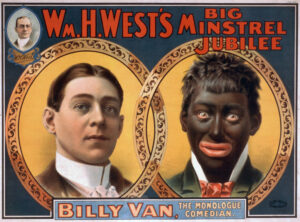 For those not familiar with blackface, it originated as makeup for portraying caricatures of black people. In the United States, it is generally considered unambiguously racist. While the use of blackface in the arts has largely ceased (though there is still controversy about white actors taking non-white roles) it has persisted in popular culture. It is most likely to be seen at costume parties, such as on Halloween. As might be suspected, the revelation that a public figure appeared in blackface can be a career ender. A few years ago, Mile Ertel resigned as the Secretary of State of my adopted state of Florida when photos of him in blackface surface. He dressed up as a black Katrina victim two months after the storm and his defenders argued that this past behavior should not have been held against him. While Ertel is a Republican, blackface is bipartisan.
For those not familiar with blackface, it originated as makeup for portraying caricatures of black people. In the United States, it is generally considered unambiguously racist. While the use of blackface in the arts has largely ceased (though there is still controversy about white actors taking non-white roles) it has persisted in popular culture. It is most likely to be seen at costume parties, such as on Halloween. As might be suspected, the revelation that a public figure appeared in blackface can be a career ender. A few years ago, Mile Ertel resigned as the Secretary of State of my adopted state of Florida when photos of him in blackface surface. He dressed up as a black Katrina victim two months after the storm and his defenders argued that this past behavior should not have been held against him. While Ertel is a Republican, blackface is bipartisan.
The release of a photo from his 1984 medical school yearbook (showing one person in blackface and another in Ku Klux Klan gear) has created a bit of a problem for the former governor of Virgina, the Democrat Ralph Northam. Since the incident occurred in 1984, his defenders argued that he should not suffer the consequences of this past action.
One time-based defense for someone who used blackface is to argue they were not aware of its history and implications and did not have racist intention. People do dress up in non-racist costumes that are odd and problematic that they think are just fine, especially when alcohol is involved.
This defense is not entirely absurd. Everyone has done stupid things from ignorance rather than malice. Also, everyone has done wrong because of lapses in judgment or due influences like alcohol or peer pressure. While it would be a fallacy to argue that something is acceptable because it is commonly done, it is reasonable to argue that judgments of behavior should consider the realities of human behavior: we consistently do dumb things for dumb reasons.
While blackface is racist, if a person used it in sincere ignorance and apologize when informed of the truth, then they should be forgiven. The problem is that the history of blackface is well known in the United States. While a very young child could reasonably claim ignorance, others would be hard-pressed to claim ignorance. They could, however, use the aberration defense: that although they did not act in ignorance, they are not racist.
While it might seem absurd to say that a person could do something racist without being racist, there is an analogy to lying. While a person who lies is a liar when they lie, it would be absurd to label a person who is usually honest a liar because they have lied. Likewise, a person who is generally not racist, but has engaged in some out of character racist behavior, should not be labeled as a racist. Naturally, there would be exceptions. The key question is whether the incident is an aberration or arising from their established character. This is where time becomes a critical factor.
To steal from Aristotle, assessing a person’s actions requires considering whether they are acting from a fixed and permanent disposition. If a person has the vice of racism, they would be consistent in their racism, and it would not be an irregular or aberrant behavior on their part. Someone who is not a racist might have done some racist acts in their past, but if these acts are few and relatively minor, then they should not be considered a racist. To use an analogy, a person who has told a few lies in the past but is generally honest should not be condemned as a liar. The same works for virtues: someone who acted bravely once but is otherwise consistently cowardly would not be a brave person.
As such, while appearing in blackface would be racist, the person should be judged not by a single racist or ignorant action. The person’s reasons for the action must be considered and, importantly, their general character must be assessed. As such, while Ertel and Northam should not have put on blackface, the act itself does not suffice to determine whether they are racists who engaged in habitual racism or non-racists who did something racist. Their complete character and history must be considered.
It could be objected that the principle of judging people based on their character and broad history of behavior rather than on a single incident is unacceptable. In the case of blackface, it could be argued that the offense is so serious that it forever marks a person, rendering them eternally unfit for public office. But the idea of eternal offenses is problematic as it makes redemption impossible.
